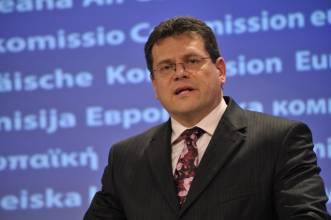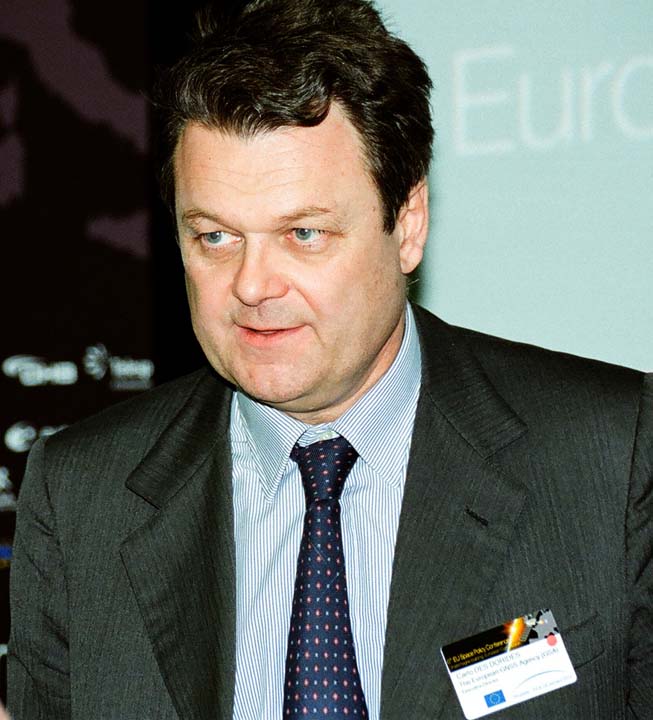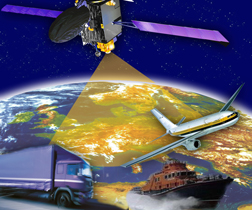 Daniel Calleja Crespo, Director-General of DG Enterprise. EC photo
Daniel Calleja Crespo, Director-General of DG Enterprise. EC photoThe European Parliament voted yesterday (October 22, 2014) to accept President-elect Jean-Claude Juncker’s “last-chance” leadership for the European Commission (EC).
But the 11th-hour reshuffling of posts appears to leave Galileo without a clear-cut leader, at least at the political level — even as the Commission and its European Space Agency (ESA) partner have decided to give up the prospect of a December launch of two satellites.
The European Parliament voted yesterday (October 22, 2014) to accept President-elect Jean-Claude Juncker’s “last-chance” leadership for the European Commission (EC).
But the 11th-hour reshuffling of posts appears to leave Galileo without a clear-cut leader, at least at the political level — even as the Commission and its European Space Agency (ESA) partner have decided to give up the prospect of a December launch of two satellites.
The Commission operates as a cabinet government, with 28 commissioners, one per EU country. The actual hands-on work of the Commission takes place within the directorates-general (DGs). For example, the EU space programs, including Galileo, for the past several years, have been administered under the DG for Enterprise and Industry.
The EC president has no say as to who the commissioners are; that’s up to the individual countries. He can only decide what each of the commissioners should be in charge of. Once he’s worked out whom he wants where, relevant parliamentary committees grill each of the candidates. Then, the European Parliament, as a whole, votes on whether to accept the EC appointees, as a whole — or not.
Juncker had positioned a dynamic up-and-comer to lead the Transport Directorate-General (quaintly known as DG MOVE) — the young, smart, cultured speaker of many languages (including Russian), Maroš Šefčovič of Slovakia, already a commissioner and the vice-president under the Barroso Presidency, where he was responsible for Inter-Institutional Relations and Administration.
Why We Care
Under Juncker’s original proposition, DG Enterprise and Industry would have been relieved of its EU space program duties, which would then be handed over to DG MOVE under Šefčovič. Šefčovič was to be the Commissioner for Transport and Space — a bit of a landmark moment, as it would have been the first time the word “space” appeared in an EU commissioner’s title.
“I do not think there was any particular thinking behind moving space back to DG MOVE,” opines one inside observer. “Probably they wanted to give the new Commissioner Mr. Šefčovič some more budget power. The logic of politicians is not always a technical logic.”
Either way, Šefčovič seemed the perfect man to take over where Antonio Tajani — former EC vice-president, commissioner of DG Enterprise and Industry, and now a member of the European Parliament — had left off. Things were looking good for Galileo. Here are some of the things people were saying inside the Brussels Beltway:
“Mr. Sefcovic knows very well all the mechanisms, tricks, and shortcuts of the European bureaucracy, and he will be able to defend the space programs from possible hostile Member States and from excess ESA independence.”
And . . .
“I personally think it is good for Galileo and Copernicus to have a Commissioner coming from a minor country. So far, Galileo has been polarized between four major contributors: France, Germany, Italy and UK. Smaller countries might ask for some more pragmatism and for some more immediate benefits for the EU.”
Slovakia, incidentally, is the country most involved in EGNOS-based road tolling infrastructure, and is involved in many activities with the European GNSS Agency (GSA), based in the neighboring Czech Republic.
Another insider noted the Slovak’s association with Tajani, saying, “I think Šefčovič will do very well, counting on Mr. Tajani’s support, currently first Vice-President of the European Parliament and a possible candidate to become President.”
And that’s when it all went wrong. It started with Slovenia’s Commissioner-Delegate Alenka Bratušek who, as the story goes, as outgoing Prime Minister of her country orchestrated her own nomination to the European Commission.
Juncker had her taking over the Energy DG, but after a woeful performance at her hearing before the relevant Parliamentary committee earlier this month, she was judged unfit for the job. Slovenia had quickly to put forward a new candidate, in the guise of Violeta Bulc, a 50-year-old telecoms entrepreneur who joined the new government in Ljubljana only last month.
Bulc’s nomination by Slovenia immediately raised hackles, with some commentators accusing Slovenia of making a out-and-out mockery of the Commission. With Bulc even less prepared than Bratušek to take up crucial responsibilities in the Energy DG, Juncker had to find something for her to do and quickly, as time was running out on getting the new Commission through Parliament.
Juncker needed a candidate of substance for the energy job. The deck had to be reshuffled; so, he took Šefčovič off of Transport and Space and put him on Energy.
For Šefčovič, the move is a victory of sorts. Already having been an EC vice-president, his assigned transport portfolio — even with space — was seen by many as a disappointment. Under the new scheme, Šefčovič would be Commission Vice-President for Energy Union.
Bulc could now be lowered into the transport position, but without the added responsibility for space. In his mission letter to Bulc, Juncker makes no mention of space, an element of the portfolio he had initially assigned to Šefčovič.
As it turns out, Juncker’s new mission letter to Šefčovič does contain one mention of space.
“During our mandate,” Juncker writes, “I would like you to focus on the following, in your role as Vice-President:” Then, some way down a list of items, we read: “Coordinating strategic policies in the field of transport and space where necessary to contribute to the objective of a resilient Energy Union, with a forward-looking climate change policy.”
The wording seems to limit Sefcovic’s authority to energy-related space activities. Of course, one could argue that all space activities are energy-related, but that seems like a stretch.
No one we have spoken to interprets this line as meaning Sefcovic is to be in charge of space policy. Everyone seems to understand, at least, that he is not to be the Commissioner for Space.
If you feel like you’re losing the plot, don’t panic. This is all par for the course when it comes to putting an EU Commission in place. Juncker’s team, now sitting pretty, was voted in by the EU Parliament.
No Room for Space
With space not moving, after all, to DG MOVE, it will logically stay put in DG Enterprise and Industry, under the control of Juncker’s new Commissioner for Internal Market, Industry, Entrepreneurship, and SMEs, Elżbieta Bieńkowska, previously Poland’s deputy prime minister and minister for infrastructure and development.
However, when Juncker chose her for the post, he had envisioned her taking over a space-less DG Enterprise and Industry.
In his mission letter to Bieńkowska, Juncker makes no mention of space, again an element he had intended for Šefčovič. And, of course, Bieńkowska made no mention of space in her own statement during her parliamentary hearing, and she was never quizzed on the subject.
All of this leads to the curious situation in which the Parliament has approved a Commission with no commissioner clearly responsible for Europe’s space programs.
Back to our unnamed insiders:
“I think it is still premature to say that Space will remain with Enterprise.”
And . . .
“It is indeed likely that DG MOVE will lose Space. It was never mentioned in Juncker’s description of his new team, but it was not positively stated that space will remain in DG Enterprise either.”
Or finally . . .
“Šefčovič was very clever, or lucky, to give up a chair he never occupied to gain a better DG and the Vice-Presidency. Transport, without space, is now considered as a demotion.”
Galileo Soldiers On
None of this seems to have fazed those actually working within the EC’s space-related units, settling back down into their chairs at DG Enterprise. They were all set to move, bodily, to a new home at DG MOVE, but then most hardened EC personnel have lived through similar starts and stops.
Below the political level, the actual work of the Commission takes place within the Directorates-General under, not surprisingly, the directors-general, and their vast staffs. The current Director-General of DG Enterprise is the very competent Daniel Calleja Crespo, and most are happy in assuming he will remain in place.
Of course, all of this stands against a backdrop of recent failure.
One voice close to the action says, “The problems of Galileo are not within the power of the Commissioner. At present, out of six satellites in orbit, only one is truly functional. Next launch, of two with Soyuz, could be in February, followed by an Arianne 5 launch in September-October [2015]. So, we’ve lost two full years — 2013 and 2014.”
Others have even stronger words. “Whoever is going to be responsible for Galileo in the future, he or she has to start to behave like a true customer [of the European Space Agency], expecting, on behalf of the European taxpayers, to get results and not inquiry boards and rescue operations.”
Furthermore, the future of Galileo will depend very much on the interaction between the new Commissioner and the future ESA Director General, possibly Jan Wörner. After 17 years of Galileo, with all its highs and lows, many would like to see both the EC and ESA stepping into a new gear, perhaps significantly reorganizing the whole program.






